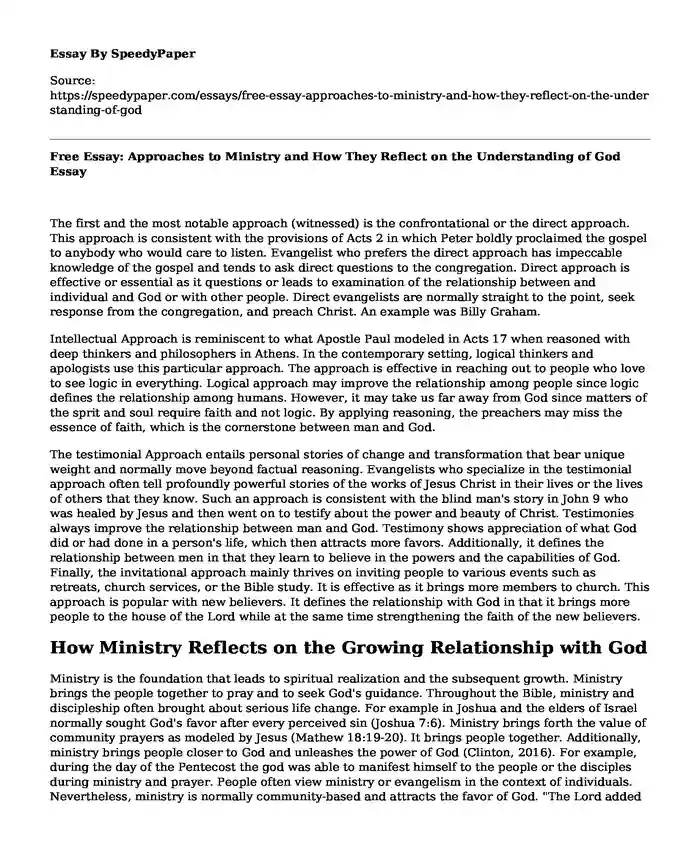The first and the most notable approach (witnessed) is the confrontational or the direct approach. This approach is consistent with the provisions of Acts 2 in which Peter boldly proclaimed the gospel to anybody who would care to listen. Evangelist who prefers the direct approach has impeccable knowledge of the gospel and tends to ask direct questions to the congregation. Direct approach is effective or essential as it questions or leads to examination of the relationship between and individual and God or with other people. Direct evangelists are normally straight to the point, seek response from the congregation, and preach Christ. An example was Billy Graham.
Intellectual Approach is reminiscent to what Apostle Paul modeled in Acts 17 when reasoned with deep thinkers and philosophers in Athens. In the contemporary setting, logical thinkers and apologists use this particular approach. The approach is effective in reaching out to people who love to see logic in everything. Logical approach may improve the relationship among people since logic defines the relationship among humans. However, it may take us far away from God since matters of the sprit and soul require faith and not logic. By applying reasoning, the preachers may miss the essence of faith, which is the cornerstone between man and God.
The testimonial Approach entails personal stories of change and transformation that bear unique weight and normally move beyond factual reasoning. Evangelists who specialize in the testimonial approach often tell profoundly powerful stories of the works of Jesus Christ in their lives or the lives of others that they know. Such an approach is consistent with the blind man's story in John 9 who was healed by Jesus and then went on to testify about the power and beauty of Christ. Testimonies always improve the relationship between man and God. Testimony shows appreciation of what God did or had done in a person's life, which then attracts more favors. Additionally, it defines the relationship between men in that they learn to believe in the powers and the capabilities of God. Finally, the invitational approach mainly thrives on inviting people to various events such as retreats, church services, or the Bible study. It is effective as it brings more members to church. This approach is popular with new believers. It defines the relationship with God in that it brings more people to the house of the Lord while at the same time strengthening the faith of the new believers.
How Ministry Reflects on the Growing Relationship with God
Ministry is the foundation that leads to spiritual realization and the subsequent growth. Ministry brings the people together to pray and to seek God's guidance. Throughout the Bible, ministry and discipleship often brought about serious life change. For example in Joshua and the elders of Israel normally sought God's favor after every perceived sin (Joshua 7:6). Ministry brings forth the value of community prayers as modeled by Jesus (Mathew 18:19-20). It brings people together. Additionally, ministry brings people closer to God and unleashes the power of God (Clinton, 2016). For example, during the day of the Pentecost the god was able to manifest himself to the people or the disciples during ministry and prayer. People often view ministry or evangelism in the context of individuals. Nevertheless, ministry is normally community-based and attracts the favor of God. "The Lord added to their number day by day those who were being saved" (Acts 2:47). Paul said' "not only has the word of the Lord sounded forth from you in Macedonia and Achaia, but also your faith in God has gone forth everywhere" (1 Thessalonians 1:8). It means that ministry defines God's response to human situations.
References
Clinton, M. (2016). Experiences of Ministry Survey 2015: Respondent Findings Report. Retrieved https://cms.churchofengland.org/sites/default/files/2017-10/respondents_report.pdf
Dawn, M., & Peterson, E. (2000). The unnecessary pastor: Rediscovering the call. Wm. B. Eerdmans Publishing.
Unit 1 Lecture Unit 1 Lecture: The Theological Context for Ministry
Unit 1: The Theological Context for Christian Ministry
Cite this page
Free Essay: Approaches to Ministry and How They Reflect on the Understanding of God. (2022, May 26). Retrieved from https://speedypaper.com/essays/free-essay-approaches-to-ministry-and-how-they-reflect-on-the-understanding-of-god
Request Removal
If you are the original author of this essay and no longer wish to have it published on the SpeedyPaper website, please click below to request its removal:
- The Fountainhead - Essay Sample on the Novel
- Essay Sample on the Reproductive Health Policy in Venezuela
- Research Paper Sample on Gambino Family Case
- Essay Example on Comparison and Contrast of Jackie Chan and Moana
- Essay Sample: "Sorry to Bother You" Analysis
- Free Essay Sample on Professional Leadership
- Paper Example: Luther Questioned the Practices of the Catholic Church
Popular categories





